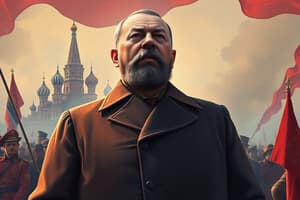Podcast
Questions and Answers
What was the primary outcome of the Treaty of Brest-Litovsk signed in 1918?
What was the primary outcome of the Treaty of Brest-Litovsk signed in 1918?
- Russia became a superpower
- Russia declared war on Germany
- Russia withdrew from WWI (correct)
- Russia joined WWI on the side of the Allies
The Russian Civil War lasted from 1918 to 1921 and was fought between the Red Army and the Blue Army.
The Russian Civil War lasted from 1918 to 1921 and was fought between the Red Army and the Blue Army.
False (B)
Who emerged as the leader of the USSR after Lenin's death?
Who emerged as the leader of the USSR after Lenin's death?
Joseph Stalin
The Bolsheviks implemented communist policies such as nationalizing industry and confiscating _____ during the consolidation of power.
The Bolsheviks implemented communist policies such as nationalizing industry and confiscating _____ during the consolidation of power.
Match the historical event with its impact:
Match the historical event with its impact:
What was a major factor contributing to the discontent among the Russian people prior to the Russian Revolution?
What was a major factor contributing to the discontent among the Russian people prior to the Russian Revolution?
The February Revolution resulted in the establishment of a communist government.
The February Revolution resulted in the establishment of a communist government.
Who led the Bolshevik Party during the October Revolution?
Who led the Bolshevik Party during the October Revolution?
The provisional government was established after the abdication of _______.
The provisional government was established after the abdication of _______.
Match the following events of the Russian Revolution with their outcomes:
Match the following events of the Russian Revolution with their outcomes:
What was the Bolsheviks' slogan during the October Revolution?
What was the Bolsheviks' slogan during the October Revolution?
The Petrograd Soviet was a council of workers and soldiers that shared power with the provisional government.
The Petrograd Soviet was a council of workers and soldiers that shared power with the provisional government.
What major global conflict was Russia involved in during the early 20th century that contributed to the revolution?
What major global conflict was Russia involved in during the early 20th century that contributed to the revolution?
Flashcards
Treaty of Brest-Litovsk
Treaty of Brest-Litovsk
Agreement in 1918 that ended Russia's involvement in World War I.
Russian Civil War
Russian Civil War
Conflict (1918-1921) between Bolsheviks (Reds) and anti-Bolshevik forces (Whites).
Bolsheviks
Bolsheviks
The communist faction led by Lenin, victorious in the Russian Civil War.
Communist Policies
Communist Policies
Signup and view all the flashcards
Soviet Union
Soviet Union
Signup and view all the flashcards
World Superpower
World Superpower
Signup and view all the flashcards
Joseph Stalin
Joseph Stalin
Signup and view all the flashcards
Russian Revolution
Russian Revolution
Signup and view all the flashcards
February Revolution
February Revolution
Signup and view all the flashcards
October Revolution
October Revolution
Signup and view all the flashcards
Tsar Nicholas II
Tsar Nicholas II
Signup and view all the flashcards
Bolsheviks
Bolsheviks
Signup and view all the flashcards
Provisional Government
Provisional Government
Signup and view all the flashcards
Economic Hardship
Economic Hardship
Signup and view all the flashcards
Industrialization
Industrialization
Signup and view all the flashcards
Political Repression
Political Repression
Signup and view all the flashcards
World War I
World War I
Signup and view all the flashcards
Study Notes
Russian Revolution Overview
- Two key events: February and October Revolutions
- Led to the overthrow of the monarchy and establishment of a communist government
- Occurred in early 20th-century Russia
Background and Causes
- Tsar Nicholas II ruled as an absolute monarch
- Widespread dissatisfaction due to several factors:
- Economic hardship: Poverty and land inequality
- Industrialization: Harsh conditions for workers
- Political repression: Suppressed dissent and limited freedoms
- World War I: Military defeats, casualties, & shortages
February Revolution (March 1917, Julian Calendar)
- Triggered by food shortages and economic hardships in Petrograd
- Troops joined protests, leading Tsar Nicholas II to abdicate
- Provisional government formed, headed by Alexander Kerensky
- Shared power with Petrograd Soviet (workers and soldiers council)
- Provisional government continued involvement in WWI, alienating the public
October Revolution (November 1917, Julian Calendar)
- Bolsheviks, led by Vladimir Lenin, gained popularity
- Slogan: "Peace, Land, and Bread"
- Promised to end the war
- Bolsheviks seized power through armed insurrection in Petrograd
- Created the world's first socialist state (later called the Soviet Union)
- Signed the Treaty of Brest-Litovsk to withdraw Russia from WWI
Civil War and Consolidation of Power
- Russian Civil War (1918-1921): Red Army (Bolsheviks) vs. White Army (anti-Bolsheviks)
- Red Army’s victory solidified Bolshevik control
- Single-party dictatorship, communist policies implemented
- Nationalized industries
- Confiscated land
- Restructured Russian society
Lasting Impact
- Formation of the Soviet Union, a global superpower
- Inspired communist movements globally
- Shaped 20th-century geopolitics
- Led to repression, purges, and centralized control under leaders like Joseph Stalin
Studying That Suits You
Use AI to generate personalized quizzes and flashcards to suit your learning preferences.



